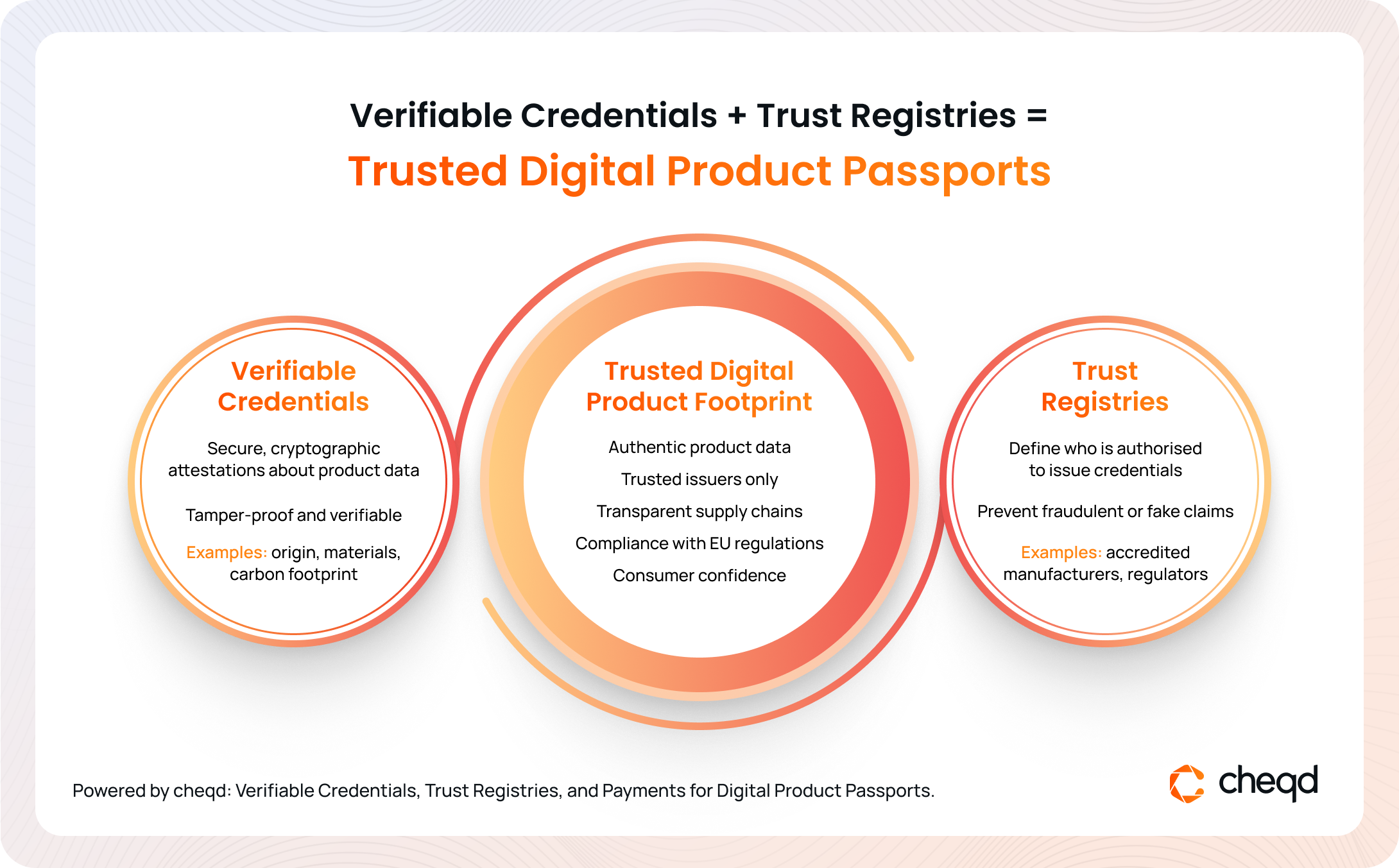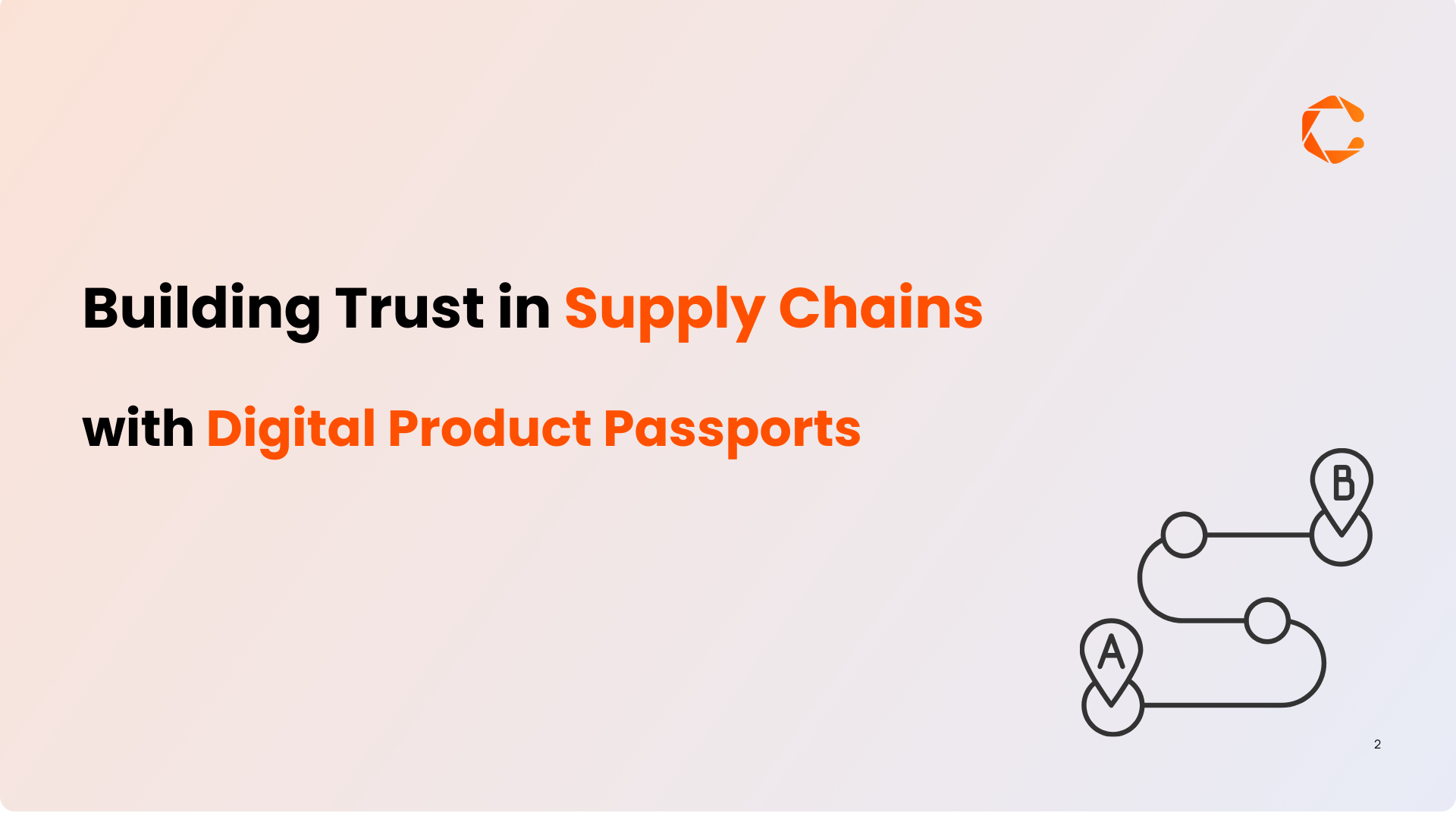Bridging the Trust Gap in Supply Chain
Global supply chains connect the world like the invisible threads that span continents and suppliers. Yet, as these networks grow more vast, the truth blurs. What lies behind the barcode? How can we verify product data, particularly on a global scale?
In 2024, investigations revealed that fashion brands Dior and Armani were linked to sweatshop labor in Italy. They were accused of prioritising profits over worker welfare despite holding sustainability certifications. The issue wasn’t the absence of oversight mechanisms, but the flaws of existing ones; many certifications rely on self-reported claims or occasional inspections that are easy to manipulate or bypass. Once awarded, these labels often go unchecked. It is rather difficult to verify whether the conditions on the ground actually match what was certified. This case exposed a deeper problem: when trust depends on static certifications, supply chains can hide exploitation and malpractice easily. The question then becomes: how can we design systems that provide ongoing, verifiable, and impenetrable evidence of trust that guides moral behaviour?
This is where Digital Product Passports come in. The DPP is a digital document that aggregates and stores data about a product and its supply chain across the entire value chain. Imagine a passport, but for your sneakers or smartphone, logging every important detail: product origin, composition, certifications, ownership history, ethics, and sustainability data. We could easily tell whether the product has actual proof of where materials came from, how workers were treated, and whether those sustainability claims hold water.
In this article, we’ll explore how Digital Product Passports work in practice, how cheqd’s technology can underpin them, and how different industries could leverage it to build more trustworthy and resilient supply chains.
Inside the Digital Product Passport Chain
A Digital Product Passport (DPP) acts as a living record of a product’s lifecycle, storing essential information that evolves as the product moves through the supply chain. From manufacturing to end-of-life, each stage contributes verified data. Let’s examine them.
1. Creation & Issuance: Establish the Digital Identity of a Product
The journey of a Digital Product Passport begins at manufacturing at the very moment of a product’s creation. A unique digital identity is issued and given to a product, like a “birth certificate”. This may be related to:
- Decentralized identifiers (DID), giving an identity to each specific product, ensuring it cannot be easily forged.
- Verifiable Credentials (VCs), proving the product’s authenticity, origin, and compliance.
A QR code, barcode, unique identifier or NFC tag embedded in the product.
2. Verification & Updates: Maintain Trust at Every Stage
As products move through suppliers, distributors, and retailers, their DPPs are updated with verifiable data. This ensures:
- Component tracking: make sure only genuine parts are used (e.g., in electronics or automotive manufacturing).
- Regulatory compliance: confirm adherence to safety and environmental standards.
- Supply chain integrity: validate sourcing claims to avoid fraud or counterfeit risks
Please note that by “update” in this section, we don’t mean altering the original credential or identifier. Here, we refer to the ongoing process of adding new verifiable credentials or revoking outdated ones. Each new credential becomes an additional layer of information attached to the product’s Digital Product Passport.
3. Consumer Interaction: Transparency & Trust in Purchasing Decisions
Customers can use a mobile app or scan a QR code at the point of purchase to view a product’s DPP. This enables them
- Product authenticity: Is this item real or counterfeit?
- Sustainability credentials: Have ethical and eco friendly practices been followed?
- Ownership history & warranties: Has this item previously been fixed or resold?
4. End-of-Life & Circular Economy: Enabling Responsible Recycling & Reuse
End-of-life management is the last phase of a product’s lifecycle, and DPPs assist in:
- Efficient recycling by detailing material composition to optimise recovery processes.
- Repair & resale markets, preventing e-waste.
- Reverse supply chains, enabling manufacturers to reclaim valuable materials.
Verifiable Credentials and Trust Registries
As explored in our earlier piece “Verifiable Credentials & Trust Registries: The Right Combination for Digital Product Passports”, Digital Product Passports are supported by two technologies: Verifiable Credentials and Trust Registries.
In plain terms, DPPs create an immutable digital record that follows a product from origin to end-of-life. But what makes this more than just another database? Cryptographic verification. By embedding Verifiable Credentials into DPPs, companies move from self reported claims to mathematically provable facts about material origins, manufacturing conditions, and sustainability credentials.
While VCs help verify individual data points, Trust Registries complement this framework by serving as the backbone of trust. Trust Registries allow organisations to confirm which entities are authorised to issue or verify credentials. This is possible because each credential contains:
- A digital signature from an issuer (represented in the form of a Decentralized Identifier) that exists within the trust registry, and
- A pointer to the accreditation or authorisation of the issuer within the trust registry, showing that they are authorised to issue a credential of a particular type or schema.
This synergy between VCs and Trust Registries creates an ecosystem where businesses, consumers, and regulators interact with verified information as the baseline standard.

Practical Use Cases Across Industries
This section will briefly touch on use cases where DPPs can be applied, to illustrate the breadth of the problem, and highlight how a solution using credentials and trust registries can apply across a selection of industries.
a. Luxury Goods & Fashion
Fake designer clothing and handbags flood the market, costing the luxury sector billions of dollars every year. According to the Federal Research Division’s U.S. Intellectual Property and Counterfeit Goods—Landscape Review of Existing/Emerging Research, 60%-80% of all counterfeit goods are consumed by the U.S. consumers. If we need to quantify this, it amounts to a $1.7 trillion global industry. Fortunately, Digital Product Passports could enable brands to fight counterfeits and validate ethical sourcing by tracking the origin and applying sustainability certifications.
Verifiable Origin Tracking — It starts at the point of sale. Luxury brands could issue verifiable credentials to tell a product’s authenticity. Customers may check the product components and ownership history of the item by scanning a QR code, safeguarding them against counterfeits. Sustainability Certifications — To demonstrate the raw materials and their ethical sourcing, brands can incorporate Fair Trade and organic material certifications into DPPs.
b. Electronics & Consumer Goods
Modern electronics are made up of components derived from multiple suppliers, quite often from various countries. This makes it challenging to verify their quality and authenticity. DPPs build trust through authenticating component quality and facilitating repairs and warranties.
Assuring Component Authenticity — Counterfeit semiconductors and batteries can trigger safety hazards. With DPPs, customers can be assured of the device components quality with safety certifications and vendor particulars. Repair and Warranties — A lesser known fact is that DPPs make repairs and warranties easier. Since the product’s history is now visible, customers and repair shops can see its condition before buying or servicing it.
c. Automotive & Aerospace
Both industries depend on accurately tracking parts and components to make sure everything is safe, compliant with regulations, and protected against fraud. DPPs improve this by:
Tracking Parts from Production to Installation — Every vehicle or aircraft component can have a unique digital identity, making it easier to detect fraudulent replacements or substandard parts. Comply to Safety Standards — With DPPs, automakers and aerospace firms could easily prove compliance to regulators that they follow safety regulations, ensuring passenger and vehicle safety. For example, ISO 9001 for quality management and AS9100 for aerospace manufacturing. Support Recalls & Investigations — In the event of a defect or safety concern, manufacturers can quickly trace affected components, streamlining recalls and regulatory investigations.
d. Pharmaceuticals & Healthcare
Counterfeit medicines pose serious health consequences whereas poor supply chain management can lead to cold chain failures, especially for temperature-sensitive drugs like vaccines. DPPs assist by transforming the logistics process.
Preventing Counterfeit Medicines — Pharmaceutical companies could issue VCs for each batch of drugs to prove their authenticity and regulatory approval. Medical professionals should verify these credentials prior to distribution for patients’ best interests. Cold Chain Logistics Integrity — DPPs could record real time temperature tracking for medications that need particular storage conditions. This guarantees the safety and effectiveness of vaccines and biologics during their transportation.
e. Sustainability & Circular Economy
As industries shift towards circular economy models where resources are reused and waste is minimised, DPPs play a crucial role in building sustainability.
Carbon Footprint Tracking — Manufacturers can issue VCs detailing the environmental impact of each product, allowing regulators and consumers to make informed decisions. Supporting Recycling & Reuse — By storing material composition data, DPPs help recyclers sort products efficiently and manufacturers reclaim high-value materials for reuse. Carbon Credit & Offset Programs — Organisations can integrate verified sustainability data into carbon offset programs, ensuring accurate reporting and claims.
By implementing Verifiable Credentials and Trust Registries, Digital Product Passports can redefine transparency and accountability across supply chains, ensuring greater trust in global trade.
cheqd - The Trust Layer to Power Verifiable Credentials and Trust Registries
Data storage is not enough to establish confidence in supply chains. It demands a verifiable and privacy-preserving approach. This is where cheqd provides the missing infrastructure. By combining Verifiable Credentials, Decentralized Identifiers, and Trust Registries, cheqd ensures that Digital Product Passports are more than digital records. They are verified by cryptography as evidence of authenticity, compliance, and sustainability.
1. Enabling Cryptographic Trust in Supply Chains
As mentioned in the introduction, traditional supply chain certifications rely heavily on self-reported data, which somehow can hide facts. With cheqd’s Verifiable Credentials, organisations can issue digitally signed, tamper-proof claims about product origin, ethical sourcing, and regulatory compliance.
2. Defining Who Can Issue & Verify Data
In global supply chains, identifying reliable entities is a huge challenge given the tangled complexity. This is resolved by cheqd’s Trust Registries, which enable regulators, certifying organisations, and manufacturers to register and accredit trusted Digital Product Passport issuers. This helps businesses know which sources are reliable as well as prevents malicious actors from issuing fake credentials.
3. Interoperability with Industry Standards
Supply chains span multiple jurisdictions and industries, each with its own compliance requirements. Because cheqd’s infrastructure is interoperable, Digital Product Passports created on cheqd can function on other continents. This refers to different ecosystems (e.g. integrate with EUDI Wallets, Swiss eID or US Department of Homeland Security standards) through the use of different interoperability profiles and credential formats.
4. Privacy-Preserving & Decentralised Data Control
Unlike traditional databases, cheqd’s infrastructure gives full control of data to organisations and users. This implies that supply chain data is not under the control of a single party. If the user wishes, only the essential components of a DPP are shared between oneself and businesses without disclosing private information.
5. Flexible Commercial Models for Supply Chain Data
cheqd allows businesses to monetise verifiable data through Credential Payments. Instead of giving away valuable supply chain data for free, organisations can set up usage-based access models, creating new revenue streams for trusted issuers and data providers.
For example, a sustainability certification body could issue Verifiable Credentials to brands that wish to display their credentials in Digital Product Passports, monetising trust in the process.
The Future of Digital Product Passports in Global Trade
Digital Product Passports is no longer a plain notion. It has in fact become a regulatory necessity since the introduction of the Ecodesign for Sustainable Products Regulation (ESPR). which marks a turning point for global trade. No longer a voluntary initiative, Digital Product Passports are becoming a regulatory requirement in the EU and a likely benchmark for other markets to follow. This shift places pressure on businesses not just to gather supply chain data, but to prove its accuracy and integrity.
We could fairly predict that companies that embrace Verifiable Credentials and Trust Registries will be able to meet these obligations with cryptographic certainty, while those relying on outdated, paper-based certifications risk falling behind. At cheqd, we provide the trust infrastructure needed to make Digital Product Passports practical, compliant, and interoperable. We help businesses stay ahead of regulation and build supply chains that can be trusted at every stage.
To find out how our infrastructure can support your digital product passports, get in touch with us at [email protected].






